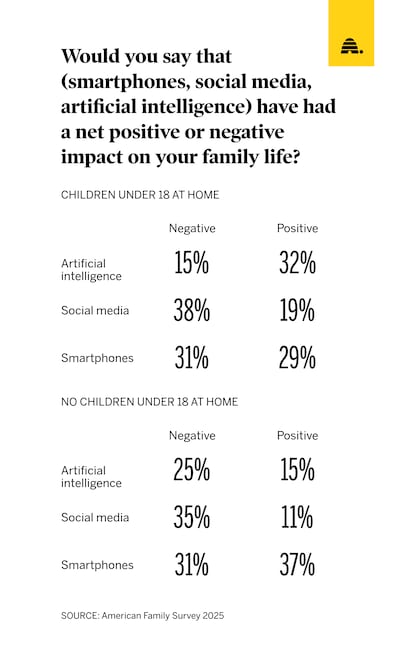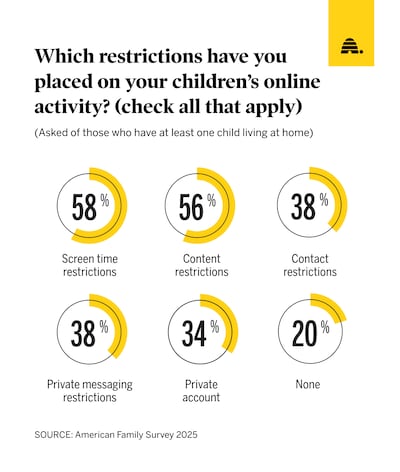- The latest American Family Survey tests national sentiment on technology's impacts.
- Tech anxiety is high even as consensus on social media, AI and smartphone use is elusive.
- Protecting children from harmful content is a uniting goal.
Bountiful mother of four Jennifer Long says raising kids in the age of smartphones, social media and AI presents a daily challenge of balancing safety, responsibility and independence.
“The great thing about phones and tech is you know where they are — you can GPS them — but the hard thing is it takes a lot more parenting effort,” Long said.
Her family’s cellphone policy has evolved as her children have grown. “My oldest was in ninth grade when she got her phone … my younger one got one in early eighth,” Long said. “My youngest just has a watch.”
Long and her husband enforce strict boundaries: Phone use ends at 10 p.m. every night, no social media until high school and all of their children’s phones have parental controls enabled. They’ve also established the open understanding that they reserve the right to monitor the kids’ phone activities.
“You don’t want to be Big Brother, but there is no expectation of privacy,” Long said.
She calls social media both “great and difficult.” Her oldest was allowed Instagram as a high school junior, but under guidance.
“I’m just trying to teach her to be social media-responsible,” Long said. “There are so many influencers and advertisers. I don’t want them scared, but educated.”
When it comes to the plethora of fast-developing artificial intelligence tools, Long sees both promise and potential peril.
“AI has a potential risk inherent to it as well,” Long said. “What is real and what is fake? It’s super tricky. AI looks real but it’s fake — it blurs that line.”
A national perspective on technology’s impacts
The complexity and nuance facing Long and her husband in working to establish the best family policies and guidance when it comes to technology is well represented in data gathered in the 2025 American Family Survey, a joint project of Brigham Young University’s Wheatley Institute, the BYU Center for the Study of Elections and Democracy, and Deseret News. The national survey was conducted Aug. 16-18 and includes responses from 3,000 U.S. adults. The survey results come with a margin of error of plus or minus 2.1 percentage points.
The wide-ranging survey included a section of inquiries seeking input on the impacts of technological marvels like smartphones, artificial intelligence and social media platforms in the midst of ongoing national debates about the ways technology is affecting families and relationships. Survey authors note the most striking finding may be that many Americans do not lean in either a positive or negative direction. Half or more say social media and AI are neither positive nor negative, and just over one-third say the same for smartphones. BYU researchers say this could indicate ambivalence or uncertainty, but because a large percentage of Americans choose this middle ground, “none of the three forms of technology is seen as mostly positive or mostly negative by a majority of Americans.”

BYU political science professor Jeremy Pope, a principal investigator for the American Family Survey, said that even as this year’s findings failed to reveal strong consensus opinions on most areas of technology, it did show broader public anxiety.
“Technology is an area where people have a lot of worry,” said Pope, who is also a senior scholar at the center and a Wheatley Institute fellow. “They worry about artificial intelligence, which we should probably label large language models, because that’s what they actually are. I think they worry about social media and about phones.”
According to the survey report, among those survey participants who took a position, opinions of AI were balanced — 22% evaluate it as positive and 21% evaluate it as negative.
“For social media, however, negative views outweigh positive by more than 2 to 1, 34% vs. 15%,” the report reads. “The only form of technology judged as a net plus for family life is the smartphone, where 37% considered its influence to be positive compared with 28% seeing it as a negative for families.”
Where families come together
Americans have relatively straightforward views of how two types of technology affect children, per survey results. They are extremely concerned about online pornography and are at least somewhat concerned about social media. The number of respondents who said pornography has a “very” negative effect is at a supermajority level.
“Combining the ‘very’ and ‘somewhat’ negative responses, 81% see pornography’s impact in negative terms,” the survey report reads. “A majority also view social media this way, with 73% saying its impact is either ‘very’ or ‘somewhat’ negative.”
But the dispersion of responses varies somewhat, according to researchers. Only a third of respondents were “very” negative on social media, while 4 in 10 fell into the “somewhat” negative category. BYU analysts note people may see some redeeming qualities in social media that prevent the most negative responses.
When it comes to supporting age-verification for access to adult content, the survey found 77% of Americans are strongly in favor of the policy. While there were some variations in levels of support, the overwhelming preference among respondents is to age-gate pornography.
BYU analysts note that while it is common to look for areas of political discord in American public life, the impact of technology on young people is an area where agreement is fairly clear.
“Americans speak with a loud and consistent voice about the harm online pornography can do to minors, and they strongly favor government regulation to enforce age limits,” the survey report reads.
Houston-based tech entrepreneur Krystal Tristan is the founder and CEO of OneHaven, a digital protection platform currently under development with the goal of keeping users safe “from the constant attack from every direction.”
“I’ve always been the mom in the room, even when I was young,” Tristan said. “I’m the worrier — the one that will walk you home at night.”
A longtime tech project manager and mother of three, Tristan said OneHaven was born from necessity.
“I couldn’t find the tools to keep my kids safe online,” Tristan said. “So I just built it myself.”
Tristan said OneHaven, which will be available to the public later this year, will help keep vulnerable users safe from harmful content but is also calling for greater accountability from both industry and government to stand up for appropriate technology protections.
“Every group needs to be doing better — corporate responsibility, government regulation,” Tristan said. “Other countries are way ahead of us. We can’t wait for Washington to do it either. No one can do it alone.”
What should regulation look like and who’s responsible?
The survey found that, when it comes to minors, significant majorities of Americans support government regulation of technology. Eight in 10 say social media companies should be required to disclose how they rank or promote content to minors, and a similar proportion say parental consent should be required to download a social media app.
But, it turns out that the levels of parental content restrictions are somewhat lower than support of government restrictions.
Nearly 60% of parents with children at home say they set restrictions on content, leaving more than 40% who don’t, according to survey results. Figures are similar for screen time restrictions, and significantly lower for contact and messaging restrictions. Surveyors note that the numbers are based on parents with children of any age living at home. Those with younger kids may have more restrictions, while those with older kids may have fewer.

The survey also explored sentiment about rules for smartphone use in schools, an issue addressed by Utah lawmakers in the 2025 session that led to new statewide restrictions on student cellphone use during instructional time.
Overall, survey results reflect that Americans seem to prefer school policies that allow smartphones at least some of the time — either after the school day or outside of classroom instruction — but that eliminate the distraction that phones might create in class. Adding together all of the options that exclude smartphones from classrooms at some level, survey data shows that 90% of Americans do not want smartphones in class.
While Long said she hasn’t followed proposed government regulations closely, she believes much of the responsibility falls on parents.
“Teenagers are going to be teenagers,” Long said. “If you want them to be socially responsible, you have to be, too. They mirror what they see.”
Her takeaway for other parents?
“You can’t just be passive,” Long said. “You have to be active — know why you’re using (technology) and not just letting things happen. Technology is a super great thing that can also be a really dangerous thing.”

